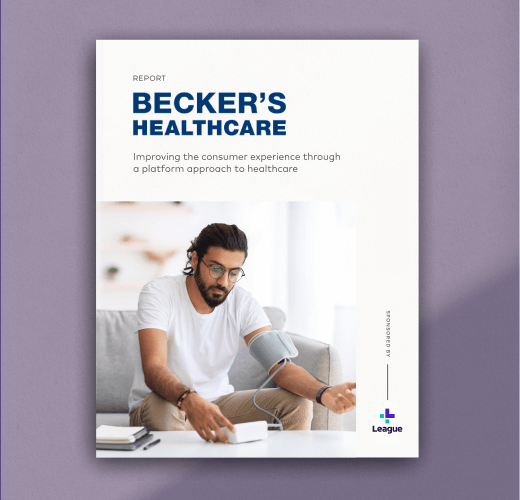Summary
- Platformization is a business model that enables a scalable value exchange between producers and consumers, that is transforming the healthcare CX industry.
- Platforms enable payers to match members with care and providers to expand reach and monetize expertise.
- Digital health platforms drive innovation, improve CX, and create competitive advantage—faster and more flexibly than in-house builds.
The process of platformization has fundamentally altered the business landscape and transformed a number of industries. From transportation and entertainment to eCommerce, platforms are now the de-facto model for industry disruption and innovation. League’s Founder and CEO Michael Serbinis puts it: “In every industry, point solutions eventually give way to platforms.” Now, it’s time for platformization to reinvent the healthcare industry.
As healthcare sits on the brink of this monumental shift, it’s worth taking a step back and leveraging the experience and knowledge of industry experts. During League Connect 2022, our Head of Platform Partnerships Andy Harlen sat down with Deloitte’s Managing Director for Digital Strategy and Transformation Matt Kaye and Senior Manager Boris Kheyn-Kheyfets to discuss their first-hand experience with platforms and how to separate the substantive information from the buzzwords.
Platform versus product—what’s the difference?
According to Kheyn-Kheyfets, platforms are much more than just a technology or a base infrastructure to build upon—fundamentally they are a business model. With this understanding, the distinction between a platform business and traditional pipeline businesses becomes more apparent. At a high level, a platform business can be viewed as a matchmaker that enables value-creating interactions between producers and consumers.
Platform business is based on enabling value by creating interactions between producers and consumers. So effectively, they are matchmakers. They identify underutilized assets and they make them more accessible through a superior UX and modular technology
BORIS KHEYN-KHEYFETS
Platformization is not a new concept. In an analog world, something as simple as a shopping mall would fit the definition of a platform. What makes platforms so transformative is the digital component, which has huge potential to unlock network effects. This is a key differentiator in the platform versus product conversation—traditional pipeline businesses compete on scale, cost, breadth and quality while platforms compete on the larger scale of network effects.
Platform business model—why is it effective for healthcare organizations?
The conversation surrounding build versus buy is a common one when considering all kinds of healthcare technologies. Organizations often assume an in-house build means complete control which, leads to product differentiation. However, our friends at Deloitte argue that these things don’t come from building everything on your own, they come from finding a platform partner that enables differentiation.
With this in mind, healthcare organizations should view platforms as viable replacements for vertical integration. Not only do platforms allow a truly custom digital brand experience, but they also offer a faster and cheaper alternative to an in-house build. From a macroeconomic perspective, competition in healthcare no longer exists exclusively around scale or control of assets. Now, it revolves around multiexperience ecosystems that are powered by system-integrated data and existing trust with members or patients.
Platforms + healthcare—what do they unlock?
Healthcare leaders know that time is critical and there is a race to gain consumer attention and trust. The winning healthcare organizations will be those who establish a continuous relationship with their members or patients. A platform enables an interoperable, ecosystem approach that helps organizations integrate quickly with new partners, easily extend and configure their digital infrastructure and adapt quickly to market changes. Once a platform ecosystem is put it place, it can unlock massive growth and revenue diversification.
There’s a lot of high-quality third-party ecosystem players out there that allow you to serve your customers exactly how you want to—and faster and cheaper.
MATT KAYE
For payers, platforms address the specific challenges, which is matching member demand with the right care. Platforms supply the data aggregation capabilities that enable matchmaking to occur by combining data with information elements like population health, wellness and consumer engagement.
Healthcare providers are looking to expand, whether that means new geographic locations, ancillary services or new markets. Platforms enable provider organizations to monetize their existing clinician network and digitize their clinical content. Providers already have the trust of patients, with the additional power of a platform they can guide more patients to the right care and services.

Becker’s Healthcare
Learn why the future of healthcare CX requires a platform approach.
